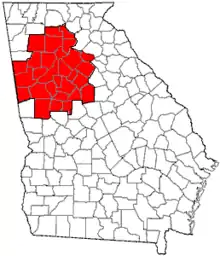Gwinnett County, Georgia
Gwinnett County is a suburban county of Atlanta in the north central portion of the U.S. state of Georgia.[2] In 2019, the population was estimated to be 936,250, making it the second-most populous county in Georgia.[1] Its county seat is Lawrenceville.[3] The county is named for Button Gwinnett, one of the signatories of the Declaration of Independence.[4]
Gwinnett County | |
|---|---|
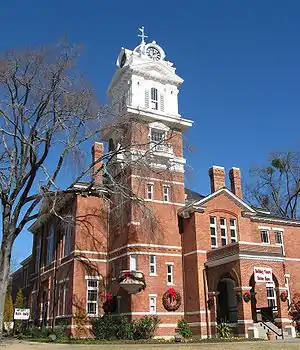 Gwinnett County (Historic) Courthouse (Administration has relocated to another building) | |
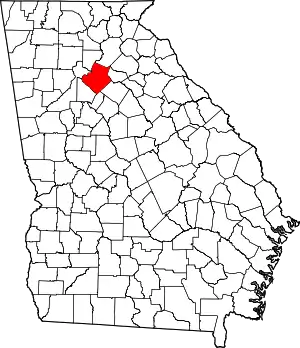 Location within the U.S. state of Georgia | |
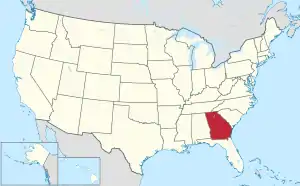 Georgia's location within the U.S. | |
| Coordinates: 33°58′N 84°02′W | |
| Country | |
| State | |
| Founded | December 15, 1818 |
| Named for | Button Gwinnett |
| Seat | Lawrenceville |
| Largest city | Peachtree Corners |
| Area | |
| • Total | 437 sq mi (1,130 km2) |
| • Land | 430 sq mi (1,100 km2) |
| • Water | 6.4 sq mi (17 km2) 1.5%% |
| Population | |
| • Estimate (2019) | 936,250[1] |
| • Density | 2,123/sq mi (820/km2) |
| Time zone | UTC−5 (Eastern) |
| • Summer (DST) | UTC−4 (EDT) |
| Congressional districts | 4th, 7th, 10th |
| Website | www |
Gwinnett County is included in the Atlanta-Sandy Springs-Roswell, GA Metropolitan Statistical Area. It is located about 10 miles northeast of Atlanta's city limits.
History
In 1813, Fort Daniel was created during the War of 1812 in territory that would become Gwinnett County.[5] The county was created in 1818 by an act of the Georgia General Assembly, Gwinnett County was formed from parts of Jackson County (formerly part of Franklin County) and from lands gained through the cession of Creek Indian lands. Named for Button Gwinnett, one of the signatories of the Declaration of Independence, the first county election was held at the home of Elisha Winn, and the first Superior Court was held in his barn. The county seat was later placed at Lawrenceville.[6]
In 1831 a group of white men were tried and found guilty in Lawrenceville for violating Georgia law by living in the Cherokee Nation without a valid passport from the Governor. Two of the men appealed to the US Supreme Court in Worcester v. Georgia, which resulted in a ruling stating that only the federal government had jurisdiction over native lands, a decision which still stands.[7]
In 1861, all three of Gwinnett County's representatives at the Georgia Constitutional Convention (1861) in Milledgeville voted against secession. Towards the end of the war, Union troops foraged in Gwinnett County as part of the Atlanta Campaign.[7] The Freedmen's Bureau was active in Gwinnett County during Reconstruction. In 1871 the courthouse in Lawrenceville was burned by the Ku Klux Klan in an attempt to avoid prosecution for their crimes, which included the shooting of a black election manager in Norcross.[8]
Early in the county's history, gold mining was a minor industry. The Gwinnett Manufacturing Company, a cotton textile factory, operated in Lawrenceville in the 1850s through 1865, when it burned. The Bona Allen Company in Buford, Georgia produced saddles, harnesses and other leather goods from 1873 to 1981.[7]
The northeastern part of Gwinnett County was removed in 1914 to form a part of the new Barrow County.
Geography
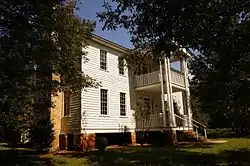
According to the U.S. Census Bureau, the county has a total area of 437 square miles (1,130 km2), of which 430 square miles (1,100 km2) is land and 6.4 square miles (17 km2) (1.5%) is water.[9] The county is located in the upper Piedmont region of the state.
It is located along the Eastern Continental Divide. A portion of the county to the northwest is a part of the Chattahoochee River National Recreation Area chain.
Allocation of water from the regional reservoir, Lake Lanier, at the extreme north of the county, has been subject to the Tri-state water dispute.
The southern and central portions of Gwinnett County are located in the Upper Ocmulgee River sub-basin of the Altamaha River basin. Most of the county's northern edge, from south of Peachtree Corners to north of Buford, is located in the Upper Chattahoochee River sub-basin of the ACF River Basin (Apalachicola-Chattahoochee-Flint River Basin). The county's eastern edge, north and south of Dacula, is located in the Upper Oconee River sub-basin of the same Altamaha River basin.[10] The map of the county is strikingly similar to Algeria.
Adjacent counties
- Forsyth County – north
- Hall County – northeast
- Jackson County – northeast
- Barrow County – east
- Walton County – southeast
- Rockdale County – south
- DeKalb County – southwest
- Fulton County – west
Transportation
Airport
The county maintains a regional airport under the name Gwinnett County Airport, formerly Briscoe Field. The closest major airport serving the region is Hartsfield–Jackson Atlanta International Airport.
Major roads and expressways
 Interstate 85
Interstate 85 Interstate 985
Interstate 985 U.S. Route 23
U.S. Route 23 U.S. Route 29
U.S. Route 29 U.S. Route 78
U.S. Route 78 State Route 8
State Route 8 State Route 10
State Route 10 State Route 13
State Route 13 State Route 20
State Route 20 State Route 84
State Route 84 State Route 120
State Route 120 State Route 124
State Route 124 State Route 140
State Route 140 State Route 141
State Route 141 State Route 264
State Route 264 State Route 316
State Route 316 State Route 317
State Route 317 State Route 324
State Route 324 State Route 347
State Route 347 State Route 365
State Route 365 State Route 378
State Route 378 State Route 403 (unsigned designation for I-85)
State Route 403 (unsigned designation for I-85) State Route 419 (unsigned designation for I-985)
State Route 419 (unsigned designation for I-985)
Interstate 285 (while not inside the county) is roughly 1.5 miles from the county line.[11]
Transit Systems
- GRTA Xpress commuter buses and Gwinnett County Transit serve the county.
- Norcross Greyhound Bus Terminal, 2105 Norcross Pkwy, Norcross, GA 30071[12]
- On April 12, 2018, Gwinnett County Officials updated the transit plans to connect to the rest of Metro Atlanta via heavy rail.[13][14][15][16][17]
Pedestrians and cycling
- Beaver Ruin Creek Greenway (Proposed)
- Camp Creek Greenway[18]
- Cedar Creek Trail Loop
- Harbins Greenway (Proposed)[19]
- Ivy Creek Greenway (Under construction)
- Ivy Creek-Snellville Trail (Proposed)[19]
- Norcross-Lilburn Trail (Proposed)[19]
- Piedmont Pathway (Proposed)[19]
- Sugar Hill Greenway (Under construction)
- Suwanee Creek Greenway (Under construction)
- The Loop Trail (Proposed)[19]
- Western Gwinnett Bikeway (Under construction)
In 2016, Suwanee unveiled the first Bike Share program in Gwinnett County. [20]
Demographics
| Historical population | |||
|---|---|---|---|
| Census | Pop. | %± | |
| 1820 | 4,589 | — | |
| 1830 | 13,289 | 189.6% | |
| 1840 | 10,804 | −18.7% | |
| 1850 | 11,257 | 4.2% | |
| 1860 | 12,940 | 15.0% | |
| 1870 | 12,431 | −3.9% | |
| 1880 | 19,531 | 57.1% | |
| 1890 | 19,899 | 1.9% | |
| 1900 | 25,585 | 28.6% | |
| 1910 | 28,824 | 12.7% | |
| 1920 | 30,327 | 5.2% | |
| 1930 | 27,853 | −8.2% | |
| 1940 | 29,087 | 4.4% | |
| 1950 | 32,320 | 11.1% | |
| 1960 | 43,541 | 34.7% | |
| 1970 | 72,349 | 66.2% | |
| 1980 | 166,903 | 130.7% | |
| 1990 | 352,910 | 111.4% | |
| 2000 | 588,448 | 66.7% | |
| 2010 | 805,321 | 36.9% | |
| 2019 (est.) | 936,250 | [21] | 16.3% |
| U.S. Decennial Census[22] 1790-1960[23] 1900-1990[24] 1990-2000[25] 2010-2013[26] | |||
Gwinnett County is often cited as one of the counties in the US that has demographically changed the most rapidly. As recently as 1990, over 90% of Gwinnett County's population was white. By 2007, the county was considered majority-minority.[27][28]
2019 ACS Estimates
| Population[29] | ||
|---|---|---|
| Group | Estimate | Percent |
| Total Population | 936,250 | |
| Population by Sex[29] | ||
| Group | Estimate | Percent |
| Male | 456,837 | 48.8% |
| Female | 479,413 | 51.2% |
| Sex ratio (males per 100 females) | 95.3 | |
| Population by Age[29] | ||
| Group | Estimate | Percent |
| Under 5 years | 60,884 | 6.5% |
| 5 to 9 years | 68,247 | 7.3% |
| 10 to 14 years | 74,117 | 7.9% |
| 15 to 19 years | 71,193 | 7.6% |
| 20 to 24 years | 60,524 | 6.5% |
| 25 to 29 years | 62,371 | 6.7% |
| 30 to 34 years | 61,208 | 6.5% |
| 35 to 39 years | 69,566 | 7.4% |
| 40 to 44 years | 63,611 | 6.8% |
| 45 to 49 years | 70,172 | 7.5% |
| 50 to 54 years | 65,628 | 7.0% |
| 55 to 59 years | 66,672 | 7.1% |
| 60 to 64 years | 43,613 | 4.7% |
| 65 to 69 years | 36,838 | 3.9% |
| 70 to 74 years | 27,310 | 2.9% |
| 75 to 79 years | 15,123 | 1.6% |
| 80 to 84 years | 9,205 | 1.0% |
| 85 years and over | 9,968 | 1.1% |
| Median age (years) | 35.8 | |
| Population by Race and Ethnicity[30] | ||
| Group | Estimate | Percent |
| White | 429,774 | 45.9% |
| --- White, not Hispanic or Latino | 329,100 | 35.2% |
| Black or African American | 266,298 | 28.4% |
| Hispanic or Latino (of any race) | 203,623 | 21.7% |
| --- Mexican | 97,109 | 10.4% |
| Asian | 126,556 | 13.5% |
| --- Vietnamese | 28,265 | 3.0% |
| --- Korean | 25,875 | 2.8% |
| --- Asian Indian | 23,737 | 2.5% |
| Some other race | 95,124 | 10.2% |
| Two or more races | 34,067 | 3.6% |
| American Indian or Alaska Native | 4,271 | 0.5% |
| Native Hawaiian and Pacific Islander | 161 | 0.0% |
| Population by Nativity and Citizenship Status[31] | ||
| Group | Estimate | Percent |
| Native (born in the United States) | 680,767 | 72.7% |
| --- Born in Georgia | 350,911 | 37.5% |
| --- Born in other U.S. state | 313,875 | 33.5% |
| ------ Southern state | 143,144 | 15.3% |
| ------ Midwestern state | 72,186 | 7.7% |
| ------ Northeastern state | 69,682 | 7.4% |
| ------ Western state | 28,863 | 3.1% |
| --- Native born outside U.S. states | 15,981 | 1.7% |
| Foreign Born | 255,483 | 27.3% |
| --- Not a U.S. citizen | 133,667 | 14.3% |
| --- Naturalized U.S. citizen | 121,816 | 13.0% |
2010 Census
As of the 2010 United States Census, there were 805,321 people, 268,519 households, and 203,238 families residing in the county.[32] The population density was 1,872.8 inhabitants per square mile (723.1/km2). There were 291,547 housing units at an average density of 678.0 per square mile (261.8/km2).[33] The racial makeup of the county was 53.3% White (44.0% Non-Hispanic White), 23.6% black or African American, 10.6% Asian, 0.5% American Indian, 0.1% Pacific Islander, 8.8% from other races, 3.1% from two or more races. Those of Hispanic or Latino origin made up 20.1% of the population.[32] In terms of ancestry, 8.3% were German, 7.8% were Irish, 7.7% were English, and 5.8% were American.[34]
Of the 268,519 households, 45.6% had children under the age of 18 living with them, 56.2% were married couples living together, 14.2% had a female householder with no husband present, 24.3% were non-families, and 19.1% of all households were made up of individuals. The average household size was 2.98 and the average family size was 3.40. The median age was 33.7 years.[32]
The median income for a household in the county was $63,219 and the median income for a family was $70,767. Males had a median income of $48,671 versus $39,540 for females. The per capita income for the county was $26,901. About 8.7% of families and 11.0% of the population were below the poverty line, including 15.1% of those under age 18 and 8.1% of those age 65 or over.[35]
Economy
- AGCO is headquartered in Duluth.
- American Megatrends is headquartered in unincorporated Gwinnett County near Norcross.[36]
- ASHRAE's world headquarters is in Peachtree Corners.[37]
- Comcast Corporation, the American global telecommunications conglomerate and owner of Xfinity and NBCUniversal, has its Southeast Headquarters in Peachtree Corners.[38]
- Canon has its southeast region headquarters in Norcross.
- Datapath, Inc., a firm specializing in secure satellite communications and wireless communications systems, is headquartered in unincorporated Gwinnett, near Duluth.
- Fortune 500 companies CarMax and Mass Mutual as well as Honeywell, Sprint Corporation, Siemens Industry Automation, Fleetcor, ACI Worldwide, and CMD Group are among the businesses in Peachtree Corners.[39][40][41]
- Hapag-Lloyd’s North American Headquarters is in Peachtree Corners.[42][43][44]
- The Harlem Globetrotters are headquartered in Peachtree Corners.
- Primerica is headquartered in unincorporated Gwinnett County, near Duluth.[45]
- Scientific Atlanta in Lawrenceville.
- United States Tennis Association (USTA)‘s headquarters for the Southern Section is in Peachtree Corners.[46]
- Waffle House is headquartered in unincorporated Gwinnett County,[47] near Norcross.[48]
- Yerkes National Primate Research Center, the CDC's primate research center located on the campus of Emory University in Atlanta, maintains its high security Yerkes Field Station, which houses most of its primates, near Lawrenceville.
Government and politics
Under Georgia's "home rule" provision, county governments have free rein to legislate on all matters within the county, provided that such legislation does not conflict with state or federal law, or state or federal Constitutions.
Gwinnett County, Georgia is governed by a five-member Board of Commissioners, which exercises both legislative and executive authority within the county. The chairman of the board is elected county-wide and serves full-time. The four other commissioners are elected from single-member districts and serve part-time positions. The board hires a county administrator who oversees daily operations of the county's twelve executive departments. Gwinnett County has a police department that operates under the authority of the Board of Commissioners. Some of the local Gwinnett city budgets have recently come under increasing scrutiny of the General Funds allocated to police services. Cities such as Duluth have allocated as much as forty percent of their city budgets, reaching some of the highest levels in the nation.[49] Solutions to high spending being discussed include additional “investment in mental health, housing, youth development and living wages would stabilize communities and prove more effective than policing.”[50]
In addition to the Board of Commissioners, county residents also elect persons to the following positions: Sheriff, District Attorney, Probate Court Judge, Clerk of State/Superior Court, Tax Commissioner, State Court Solicitor, Chief Magistrate Judge (who appoints other Magistrate Court judges), Chief Superior Court Judge and Superior Court Judges, and Chief State Court Judge and State Court Judges.
Gwinnett County has the largest public school system in the state of Georgia. Members of the Board of Education are elected from special election districts in the county.
For most of the time from 1964 to 2012, the county was a Republican stronghold in presidential elections. The only Democrat to carry the county in this period was former Georgia governor Jimmy Carter in 1976, who carried Gwinnett during his sweep of every county in the state. However, the Republican edge has narrowed in recent times as the county, as well as the rest of the Atlanta metro, have gotten larger and more diverse. In 2016, Hillary Clinton became the first Democrat to win Gwinnett County in 40 years and the first non-Georgian Democrat to do so since John F. Kennedy in 1960, doing so by 5.9 points. In 2018, Stacey Abrams became the first Democrat to win Gwinnett County in a gubernatorial election since 1986 when Joe Frank Harris swept every county statewide. The Democratic trend became even more apparent in 2020, when Joe Biden won the county by 18.2 points, the best showing for a non-Georgian Democrat since Kennedy.
| Year | Republican | Democratic | Third parties |
|---|---|---|---|
| 2020 | 40.1% 166,400 | 58.4% 241,994 | 1.3% 5,629 |
| 2016 | 44.4% 146,989 | 50.2% 166,153 | 5.4% 17,808 |
| 2012 | 53.8% 159,855 | 44.6% 132,509 | 1.7% 4,992 |
| 2008 | 54.6% 158,746 | 44.4% 129,025 | 1.1% 3,167 |
| 2004 | 65.7% 160,445 | 33.4% 81,708 | 0.9% 2,190 |
| 2000 | 63.7% 121,756 | 32.2% 61,434 | 4.1% 7,921 |
| 1996 | 59.3% 96,610 | 33.0% 53,819 | 7.7% 12,516 |
| 1992 | 54.3% 81,822 | 29.4% 44,253 | 16.3% 24,501 |
| 1988 | 75.5% 66,372 | 23.8% 20,948 | 0.7% 620 |
| 1984 | 79.5% 54,749 | 20.5% 14,139 | |
| 1980 | 52.8% 27,185 | 42.7% 21,958 | 4.5% 2,309 |
| 1976 | 40.0% 13,912 | 60.0% 20,838 | |
| 1972 | 86.3% 18,181 | 13.7% 2,896 | |
| 1968 | 30.6% 5,350 | 18.5% 3,230 | 50.9% 8,909 |
| 1964 | 50.4% 6,823 | 49.6% 6,705 | 0.0% 3 |
| 1960 | 26.5% 2,336 | 73.5% 6,479 | |
| 1956 | 20.2% 1,443 | 79.8% 5,687 | |
| 1952 | 14.4% 1,015 | 85.6% 6,026 | |
| 1948 | 11.1% 413 | 76.0% 2,832 | 12.9% 482 |
| 1944 | 17.6% 713 | 82.4% 3,339 | |
| 1940 | 15.3% 728 | 84.3% 4,023 | 0.4% 20 |
| 1936 | 18.5% 541 | 81.4% 2,382 | 0.1% 3 |
| 1932 | 3.4% 91 | 96.6% 2,616 | 0.0% 1 |
| 1928 | 52.3% 1,062 | 47.7% 970 | |
| 1924 | 15.5% 207 | 75.8% 1,011 | 8.7% 116 |
| 1920 | 40.9% 1,140 | 59.1% 1,645 | |
| 1916 | 13.4% 270 | 75.6% 1,528 | 11.0% 222 |
| 1912 | 35.9% 590 | 60.7% 997 | 3.4% 55 |
| 1908 | 32.7% 541 | 41.0% 677 | 26.2% 433 |
| 1904 | 5.9% 132 | 55.2% 1,219 | 38.7% 856 |
| 1900 | 22.5% 373 | 63.4% 1,052 | 14.0% 233 |
| 1896 | 35.7% 773 | 57.8% 1,250 | 6.3% 138 |
| 1892 | 9.2% 253 | 57.1% 1,572 | 33.6% 926 |
| 1888 | 8.4% 186 | 90.5% 2,004 | 1.0% 23 |
| 1884 | 11.7% 146 | 88.2% 1,094 | |
| 1880 | 11.8% 244 | 88.1% 1,812 |
Gwinnett County is one of six "reverse pivot counties", counties that voted Republican in 2008 and 2012, and voted Democratic in 2016, 2018, and 2020.
Gwinnett County Board of Commissioners
| District | Name | Party | First elected | Incorporated Cities of Gwinnett County represented[52] | |
|---|---|---|---|---|---|
| At-Large (Chair) | Nicole Love Hendrickson | Democratic | 2020 | All | |
| 1 | Kirkland Carden | Democratic | 2020 | Duluth, Suwanee, Sugar Hill | |
| 2 | Ben Ku | Democratic | 2018 | Peachtree Corners, Berkeley Lake, Lilburn, Norcross, Tucker | |
| 3 | Jasper Watkins III | Democratic | 2020 | Auburn, Braselton, Dacula, Lawrenceville, Grayson, Loganville, Snellville | |
| 4 | Marlene Fosque | Democratic | 2018 | Buford, Lawrenceville, Rest Haven, Sugar Hill | |
United States Congress
| Senators | Name | Party | First Elected | Level | |
|---|---|---|---|---|---|
| Senate Class 2 | Raphael Warnock | Democratic | 2021 | Junior Senator | |
| Senate Class 3 | Jon Ossoff | Democratic | 2021 | Senior Senator | |
| Representatives | Name | Party | First Elected | Area(s) of Gwinnett County represented | |
| District 4 | Hank Johnson | Democratic | 2006 | Lilburn, Norcross, Snellville | |
| District 7 | Carolyn Bourdeaux | Democratic | 2020 | Peachtree Corners, Duluth, Lawrenceville, Lilburn, Suwanee, Buford, Snellville | |
| District 10 | Jody Hice | Republican | 2015 | Dacula, Loganville | |
Georgia State Senate
| District | Name | Party | First Elected | Area(s) of Gwinnett County represented | |
|---|---|---|---|---|---|
| 5 | Sheikh Rahman | Democratic | 2018 | Peachtree Corners, Lawrenceville, Lilburn, Norcross | |
| 9 | Nikki Merritt | Democratic | 2020 | Dacula, Grayson, Lawrenceville, Lilburn, Loganville, Mountain Park, Snellville | |
| 40 | Sally Harrell | Democratic | 2018 | Peachtree Corners, Norcross | |
| 41 | Kim Jackson | Democratic | 2020 | Lilburn | |
| 45 | Clint Dixon | Republican | 2020 | Auburn, Braselton, Buford, Lawrenceville, Rest Haven, Sugar Hill, Suwanee | |
| 48 | Michelle Au | Democratic | 2020 | Peachtree Corners, Berkeley Lake, Duluth, Lawrenceville, Norcross, Suwanee | |
| 55 | Gloria Butler | Democratic | 1998 | Grayson, Loganville, Mountain Park, Snellville | |
Georgia House of Representatives
Hospitals
- Northside Hospital – Lawrenceville
- Northside hospital – Duluth
- Eastside Medical Center – Snellville. Formerly Emory Eastside Medical Center, the hospital was purchased by Hospital Corporation of America in 2011.
Media
The county's main newspaper is the Gwinnett Daily Post.
The Spanish language newspaper El Nuevo Georgia has its headquarters in unincorporated Gwinnett County, near Norcross.[54][55]
Telemundo Atlanta and The Atlanta Journal-Constitution are both based out of Gwinnett.
Education
Primary and secondary schools
Gwinnett County Public Schools operates the public schools for residents in Gwinnett County, with the exception of residents inside the Buford city limits, which are served by the Buford City School District. There are 143 schools in the district—21 high schools, 29 middle schools, 80 elementary schools and 13 specialty schools, making it the largest school district in Georgia.
Private education
- Greater Atlanta Christian School, the second-largest independent school in Georgia, is located in Norcross.
- Hebron Christian Academy is located in Dacula.
- Providence Christian Academy is located in Lilburn
- Seigakuin Atlanta International School, a private Japanese education system elementary and middle school, was located in Peachtree Corners.[56][57] The school moved from property at Oglethorpe University to its current address, former property of the Romanian First Baptist Church, in 2003.[58]
- Wesleyan School is located in Peachtree Corners.
Colleges and universities
- Georgia Gwinnett College is located in Lawrenceville.
- Gwinnett Technical College is also located in Lawrenceville.
- Philadelphia College of Osteopathic Medicine is located in Suwanee.
- Trevecca Nazarene University has an adult education site in Duluth.[59]
- University of Georgia has a satellite campus in Lawrenceville.
Sports
Minor-league affiliates of the NHL Boston Bruins and the MLB Atlanta Braves play home games and talent scout in the area.
In 2016, the Georgia Swarm of the National Lacrosse League relocated from Minnesota and began playing games at Infinite Energy Arena. The team won the league championship in 2017.
Georgia Force of Arena Football League had also played at Arena at Gwinnett Center before the team folded in 2012.
| Club | Sport | League | Venue | Founded | Titles |
|---|---|---|---|---|---|
| Atlanta Gladiators | Ice hockey | ECHL | Infinite Energy Arena | 1995 | 0 |
| Atlanta United 2 | Soccer | United Soccer League | Coolray Field | 2017 | 0 |
| Gwinnett Stripers | Baseball | International League | Coolray Field | 2009 | 0 |
| Georgia Swarm | Lacrosse | National Lacrosse League | Infinite Energy Arena | 2004 | 1 |
Gwinnett also hosts the Gwinnett Lions Rugby Football Club, a Division 3 Men's Rugby Team competing in the Georgia Rugby Union.
Communities
Cities
- Auburn (partly in Barrow County)
- Berkeley Lake
- Buford (partly in Hall County)
- Dacula
- Duluth
- Grayson
- Lawrenceville
- Lilburn
- Loganville (partly in Walton County)
- Norcross
- Peachtree Corners
- Snellville
- Sugar Hill
- Suwanee
Towns
- Braselton (partly in Jackson County, Hall County, and Barrow County)
- Rest Haven (partly in Hall County)
Census-designated places
Unincorporated communities
Notable people
- David Andrews, NFL football player with the New England Patriots.[60]
- Elijah Bryant (born 1995), basketball player in the Israeli Basketball Premier League
- Sam Flint (1882 – 1980), actor.
- Chandler Massey, actor (Days of Our Lives); received the 2012, 2013, and 2014 Daytime Emmy Award for Outstanding Younger Actor in a Drama Series. In 2012, Massey became the first actor ever to receive a Daytime Emmy Award for playing a gay character.[61]
- James Ramsey, Major League Baseball player with the Los Angeles Dodgers.[62]
- Trey Thompkins, basketball player formerly with Los Angeles Clippers.[63]
- Brice Butler, NFL wide receiver with the Dallas Cowboys.[64]
- Jodie Meeks, NBA shooting guard with the Washington Wizards.[65]
- Rittz, musician.
- Migos, hip hop group.
See also
References
- "Population estimates, July 1, 2018, (V2018)". Census.gov. Retrieved June 22, 2019.
- "About Gwinnett". Gwinnettcounty.com. Retrieved May 26, 2017.
- "City of Lawrenceville, Georgia - Home Page". Lawrencevillega.org. Retrieved June 29, 2016.
- Gannett, Henry (1905). The Origin of Certain Place Names in the United States. Govt. Print. Off. pp. 146.
- D'Angelo, James J. (July 15, 2011). "Fort Daniel". New Georgia Encyclopedia. Retrieved October 23, 2020.
- "History of Gwinnett County". Gwinnetths.org. Gwinnett Historical Society. Retrieved December 19, 2014.
- Gagnon, Michael (2018). Gwinnett County: A Bicentennial Celebration. Gwinnett Historical Society: Gwinnett Historical Society.
- Holman, Tyler (2018). "A Destructive Conflagration". Georgia Backroads. 17 (4): 39–43.
- "US Gazetteer files: 2010, 2000, and 1990". United States Census Bureau. February 12, 2011. Retrieved April 23, 2011.
- "Georgia Soil and Water Conservation Commission Interactive Mapping Experience". Georgia Soil and Water Conservation Commission. Retrieved November 18, 2015.
- https://www.google.com/maps/dir/33.9050598,-84.2380705/33.8920281,-84.2591024/@33.8961318,-84.2576322,16z/data=!4m2!4m1!3e0
- "Norcross GA Bus Station - Greyhound". locations.greyhound.com.
- "Gwinnett's transit plans now include running heavy rail into county". Myajc.com.
- Curt Yeomans. "Gwinnett County officials proposing MARTA-style heavy rail line". Gwinnettdailypost.com.
- "Gwinnett Considers Adding heavy Rail to Transit". Bizjournals.com. Retrieved July 12, 2018.
- Curt Yeomans. "Gwinnett County officials proposing MARTA-style heavy rail line". Gwinnettdailypost.com.
- "Gwinnett transit plan includes heavy rail connection to Doraville". Ajc.com.
- "New Camp Creek Greenway bridge opens in Lilburn". Ajc.com.
- "Gwinnett trails master plan unveiled for review". Ajc.com.
- Curt Yeomans. "Suwanee unveils new bike sharing stations". Gwinnettdailypost.com.
- "2019 County Metro Population Estimates". Retrieved March 26, 2020.
- "U.S. Decennial Census". United States Census Bureau. Retrieved June 22, 2014.
- "Historical Census Browser". University of Virginia Library. Retrieved June 22, 2014.
- "Population of Counties by Decennial Census: 1900 to 1990". United States Census Bureau. Retrieved June 22, 2014.
- "Census 2000 PHC-T-4. Ranking Tables for Counties: 1990 and 2000" (PDF). United States Census Bureau. Retrieved June 22, 2014.
- "State & County QuickFacts". United States Census Bureau. Archived from the original on June 24, 2011. Retrieved June 22, 2014.
- Estep, Tyler (November 24, 2017). "In deeply diverse Gwinnett, white residents confront minority status". The Atlanta Journal-Constitution. Retrieved June 8, 2020.
- "Gwinnett's transformation: Just 14 percent white by 2050?". Atlanta Journal-Constitution. April 12, 2017. Retrieved June 8, 2020.
- "2019 ACS Age and Sex 1-Year Estimates". United States Census Bureau. Retrieved September 22, 2020.
- "2019 ACS Demographic and Housing 1-Year Estimates". United States Census Bureau. Retrieved September 22, 2020.
- "2019 ACS Place of Birth by Nativity and Citizenship Status 1-Year Estimates". United States Census Bureau. Retrieved September 22, 2020.
- "Demographics of Gwinnett County, Georgia". United States Census Bureau. Retrieved December 29, 2015.
- "Population, Housing Units, Area, and Density: 2010 - County". United States Census Bureau. Archived from the original on February 13, 2020. Retrieved December 29, 2015.
- "DP02 SELECTED SOCIAL CHARACTERISTICS IN THE UNITED STATES – 2006-2010 American Community Survey 5-Year Estimates". United States Census Bureau. Archived from the original on February 13, 2020. Retrieved December 29, 2015.
- "DP03 SELECTED ECONOMIC CHARACTERISTICS – 2006-2010 American Community Survey 5-Year Estimates". United States Census Bureau. Archived from the original on February 13, 2020. Retrieved December 29, 2015.
- "Contact Us." American Megatrends. Retrieved on May 6, 2009.
- "Environmental technology nonprofit relocating to Peachtree Corners". ajc.com. The Atlanta Journal-Constitution / Cox Media Group. Retrieved April 15, 2019.
- Huppertz, Karen. "New Comcast headquarters will bring 150 new jobs to Peachtree Corners". ajc.com. The Atlanta Journal-Constitution. Retrieved October 25, 2017.
- "Economic Development". peachtreecornersga.gov. City of Peachtree Corners. Retrieved October 23, 2017.
- "MassMutual moves from Perimeter to Peachtree Corners". ajc.com. The Atlanta Journal-Constitution / Cox Media Group. Retrieved April 15, 2019.
- Mason, Mike (July 2019). "Peachtree Corners Continues to Prosper" (PDF). files.constantcontact.com. Peachtree Corners, GA. Retrieved July 15, 2019.
- "United Arab Shipping Company Relocates North American Headquarters Creating 160 Jobs in Gwinnett County". Cresa.com.
- "Hapag-Lloyd and UASC complete merger". hapag-lloyd.com. Hapag-Lloyd. Retrieved October 23, 2017.
- "Praised for Quality: High Distinctions for Hapag-Lloyd - Hapag-Lloyd received a number of prestigious awards in September. In addition to being praised for its quality and products as a carrier, the company was also honored for rescuing people stranded at sea". hapag-lloyd.com. Hapag-Lloyd AG. Retrieved December 12, 2019.
- "Contact Us." Primerica. Retrieved on January 5, 2010.
- "GET TO KNOW THE USTA SECTIONS". usta.com. United States Tennis Association. Retrieved October 25, 2017.
- "Contact Us Archived 2010-04-27 at the Wayback Machine." Waffle House.that doesent make sense Retrieved on May 19, 2009.
- Woods, Mark. "If this is what it gets to, it's bad." The Florida Times-Union. May 3, 2009. Retrieved on May 19, 2009.
- "CITY OF DULUTH GEORGIA : ANNUAL BUDGET REPORT : FISCAL YEAR 2017" (PDF). Duluthga.net. Retrieved July 12, 2018.
- McCarthy, Niall. "How Much Do U.S. Cities Spend Every Year On Policing? [Infographic]". Forbes.com.
- Leip, David. "Dave Leip's Atlas of U.S. Presidential Elections". uselectionatlas.org. Retrieved March 20, 2018.
- Commission District Map
- Rep. Kirby was elected in a special election in March 2012.
- "Contáctenos." El Nuevo Georgia. Retrieved on September 18, 2012.
- "Media Kit 2011." (in English) (Archive) El Nuevo Georgia. p. 7. Retrieved on September 18, 2012. "5855 Jimmy Carter Blvd. Norcross, GA 30071"
- "Map" (Map Archived 2007-12-16 at the Wayback Machine). Seigakuin Atlanta International School. Retrieved on January 11, 2012. "5505 Winters Chapel Road, Atlanta, GA 30360 USA"
- "Relocating school has Japan ties." Atlanta Journal-Constitution. September 29, 2002. JJ1. Retrieved on January 11, 2012.
- "History ." Seigakuin Atlanta International School. Retrieved on January 11, 2012.
- "Trevecca to offer adult, graduate degree programs in Atlanta area". Church of the Nazarene. February 2018. Retrieved January 15, 2020.
- "David Andrews". Archived from the original on August 21, 2016. Retrieved May 20, 2016.
- "Peachtree Corners' Chandler Massey Nominated for Emmy". Peachtree Corners, GA Patch. May 15, 2013.
- "Wesleyan grad Ramsey named nation's top player". www.gwinnettdailypost.com. Retrieved January 28, 2015.
- "Wesleyan grad Thompkins staying at UGA". Gwinnett Daily Post. April 14, 2010.
- "Cowboys' trade with Oakland for Brice Butler finalized". Irving, TX ESPN.com. November 2, 2015.
- "Jodie Meeks is Wizards latest shot to help beleaguered bench". Washington, DC The Washington Times. July 13, 2017.
External links
| Wikimedia Commons has media related to Gwinnett County, Georgia. |
